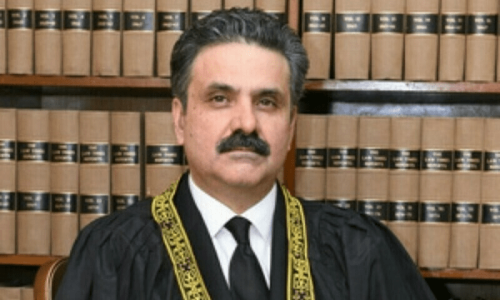GENEVA: World powers began two days of talks with Iran in Geneva on Thursday, hoping to reach a “first step” deal over Tehran's nuclear programme, although both sides said a breakthrough was far from certain.
Iranian Foreign Minister Mohammad Javad Zarif expressed guarded optimism that an agreement to start resolving the decade-old dispute would be reached in Geneva this week. “If everyone tries their best we may have one,” he told reporters.
“We expect serious negotiations,” he said after a breakfast meeting with European Union foreign policy chief Catherine Ashton, who is coordinating talks with Iran on behalf of six major powers. But Zarif added on his Facebook page that the negotiations would be “very difficult”.
The United States and its allies say they are encouraged by Tehran's shift to friendlier rhetoric since the June election of President Hassan Rouhani. Following years of hostility, Rouhani has promised to try to repair relations ties with the West and win relief from sanctions which are crippling the Iranian economy.
But the Western allies say Iran must back its words with action and take concrete steps to scale back its atomic work, which they suspect has military aims, a charge Tehran denies.
“What we're looking for is a first phase, a first step, an initial understanding that stops Iran's nuclear programme from moving forward and rolls it back for the first time in decades,” a senior US official said on the eve of the talks. That would help buy time needed for Iran and the powers - the United States, Russia, China, France, Britain and Germany - to reach a broader diplomatic settlement in a dispute that could otherwise plunge the Middle East into a new war.
The six nations want Iran to suspend its most sensitive uranium enrichment efforts, reduce its stockpile of such material and diminish its capacity to produce it in the future.
In return for any concessions, Iran wants the powers to lift the sanctions that have slashed its oil revenues by 60 percent in the past two years and devalued its rial currency by more than half.
Talks Enter Serious Phase
The exact nature of a possible first step remain unclear, but the six nations are unlikely to agree on anything less than a suspension of enrichment of uranium to 20 percent fissile purity, a level that constitutes a major advance on the way to making weapons.
The US official said Iran at this stage must address important aspects of its nuclear programme, including sufficient international monitoring. Iran's construction of a research reactor near the town of Arak is also a growing concern for the West because it could yield plutonium for bombs.
“We're looking for ways to put additional time on the clock,” the administration official added.
A senior aide to a US senator briefed by the White House and State Department said Washington would offer to work with Iran in a six-month confidence-building period. During that time, Washington would offer Tehran relaxed restrictions on Iran's funds held in overseas accounts. It could also ease sanctions on trade in gold and petrochemicals.
In exchange, Iran would stop enriching uranium to 20 per cent and convert its existing stockpile of 20 per cent uranium to an oxide form suitable for processing into reactor fuel and take other measures to slow the programme. The aide said the concessions being sought would “neither freeze nor set back” Iran's nuclear programme and that the Senate would have to act immediately to impose further sanctions on Iran.
The House of Representatives overwhelmingly passed a new sanctions bill in July that aims to reduce Iran's oil exports to a trickle in a year. The Senate's banking panel had been expected to introduce its version of the bill in September, but the Obama administration has pushed it to delay the new legislation in order to give the Geneva talks a chance.
Another diplomat from the six nations said any agreement reached in Geneva could address some of the international concerns, but not all, leaving other issues to be discussed in future rounds of talks.
Western diplomats are hesitant to divulge specifics about the talks due to sensitivities involved - both in Tehran, where conservative hardliners are sceptical about striking deals that could curtail the nuclear programme, and in Washington, where hawks oppose a precipitate easing of sanctions.
An Israeli official said on Wednesday the six powers and Iran were expected to discuss an agreement that would fall far short of Israeli expectations, describing it as a “bad deal”.
Widely assumed to be the Middle East's only nuclear power, Israel has warned it could launch pre-emptive strikes against Iranian nuclear sites if diplomacy fails to stop the programme.
Tehran says it needs nuclear energy for electricity generation and medical purposes.















































